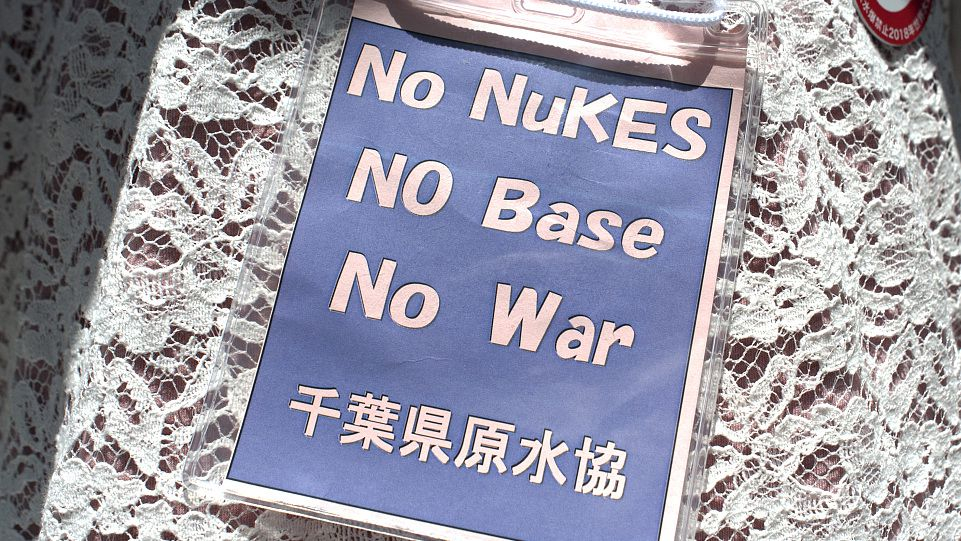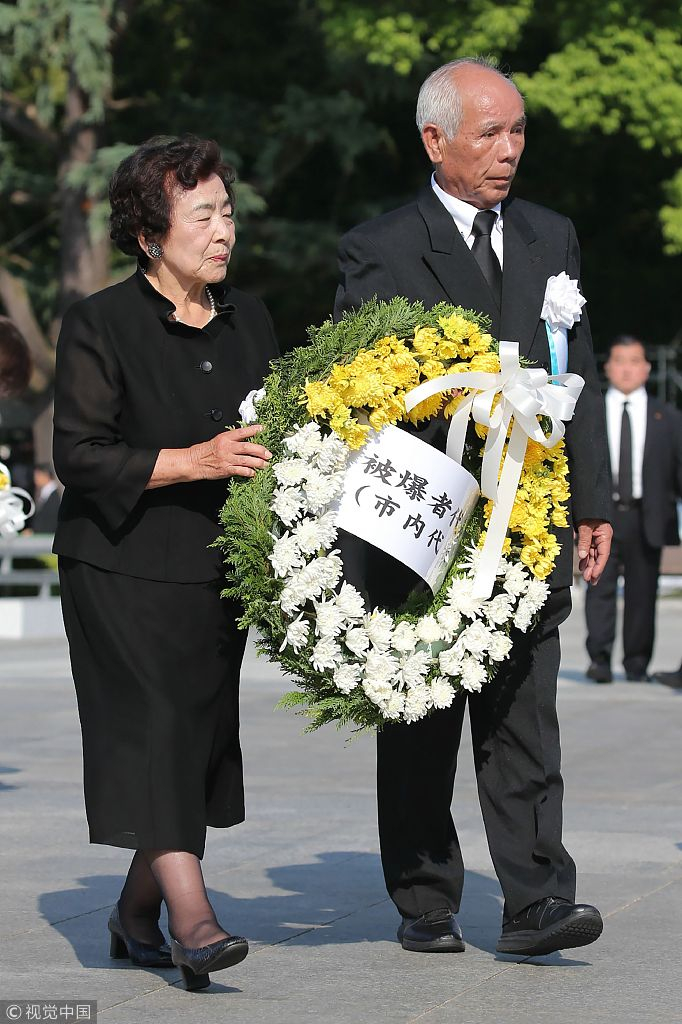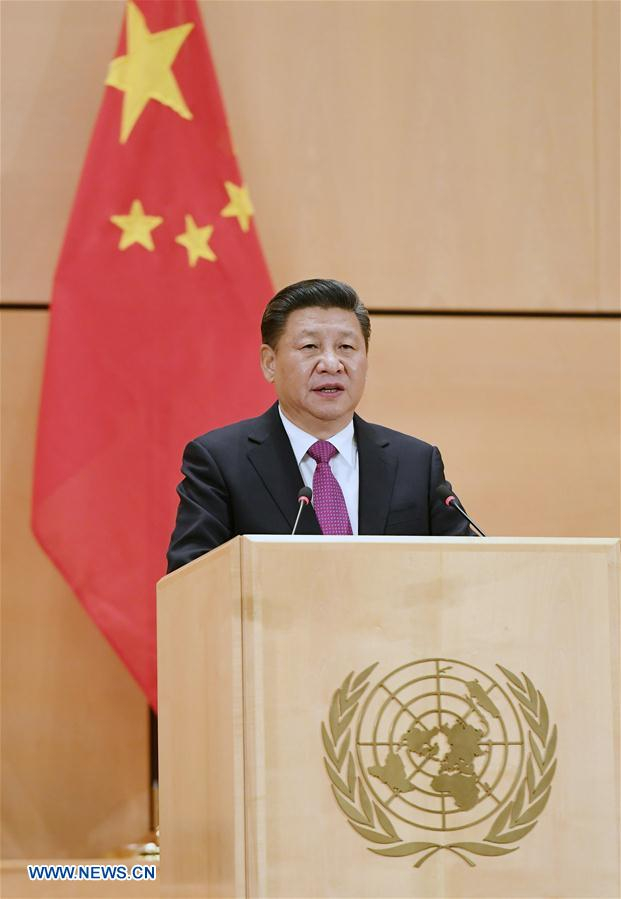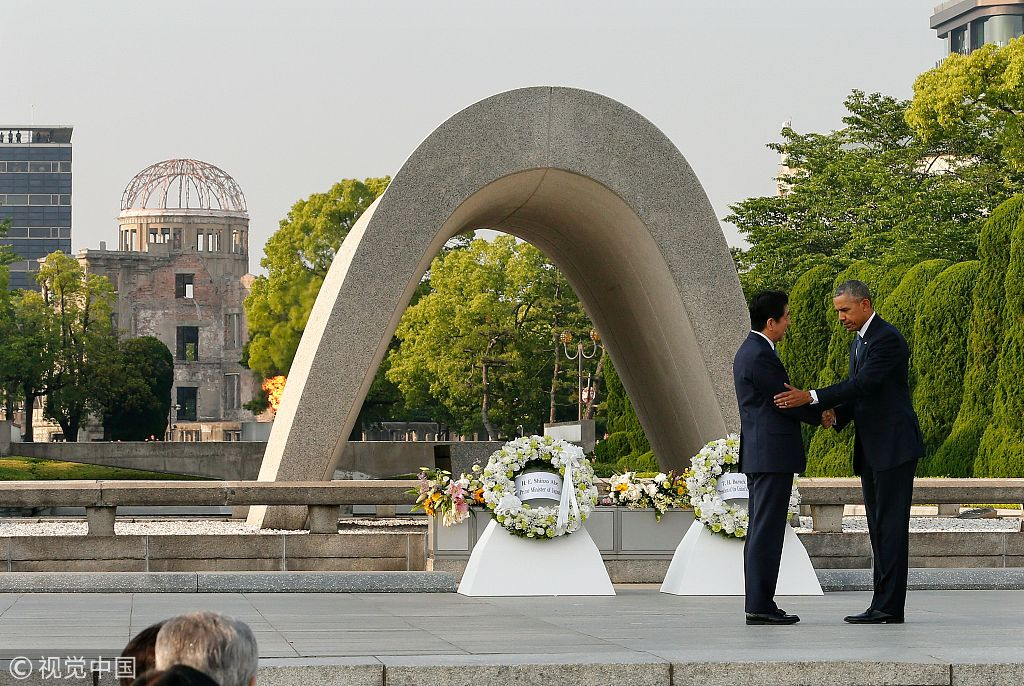
World
09:08, 30-Jan-2019
China wants nuclear-weapons-free world, what about other nations?
Updated
11:19, 30-Jan-2019
By Li Zhao

“People looked like ghosts, bleeding and trying to walk before collapsing. Some had lost limbs.”
“The smell of burning flesh was overpowering,” Sunao Tsuboi, survivor from the 1945 Hiroshima atomic bomb, recalled what he had experienced more than 70 years ago to the Guardian.
“What I did see convinced me that I had entered a living hell on earth.”
Tsuboi was lucky—he kept his life from the nuclear blast at least. Yet no one is able to escape a nuclear blast unscathed. The facial scars he has carried for seven decades, the two cancer diagnoses and the chronic health problems related to nuclear remnants are proof enough.

Atomic bomb survivors offer a wreath during the 73rd anniversary memorial service for the atomic bomb victims at the Peace Memorial Park in Hiroshima, Japan, August 6, 2018. /VCG Photo
Atomic bomb survivors offer a wreath during the 73rd anniversary memorial service for the atomic bomb victims at the Peace Memorial Park in Hiroshima, Japan, August 6, 2018. /VCG Photo
Numerous people's lives were taken from the Hiroshima and Nagasaki bombings (both in Japan), only two instances that nuclear weapons were weaponized in warfare. Although the real mortality will never be known, estimate lies anywhere from 150,000 to 246,000.
The A-bomb victim told the Guardian he would ask his government officials to do everything to rid the world of nuclear weapons, “I will continue to repeat that demand until my last breath.”
That is something that will be high on the Wednesday meeting's agenda between the five main nuclear nations. Held in Beijing, the meeting of China, the U.S., Russia, the UK and France is expected to discuss nuclear disarmament and nonproliferation of nuclear weapons, according to the Chinese Foreign Ministry.
The meeting is also aimed at maintaining the mechanism that was established based upon the Treaty on the Non-Proliferation of Nuclear Weapons.
China: A world free of nuclear weapons
During a speech at the United Nations in January 2017, Chinese President Xi Jinping has called for a final comprehensive ban on nuclear weapons.

Chinese President Xi Jinping delivers a speech at the United Nations Office in Geneva, Switzerland, January 18, 2017. /VCG Photo
Chinese President Xi Jinping delivers a speech at the United Nations Office in Geneva, Switzerland, January 18, 2017. /VCG Photo
“Nuclear weapons, the Sword of Damocles that hangs over mankind, should be completely prohibited and thoroughly destroyed over time to make the world free of nuclear weapons,” President Xi said in Geneva.
However, two months later China did not attend a UN convention regarding the prohibition of nuclear weapons, missing talks which were also bypassed by the other four permanent UN Security Council member nations.
“Whether we show up at the negotiating table or not, there is no change to China's position on supporting a final comprehensive ban on and total destruction of nuclear weapons,” said Chinese Foreign spokesperson Hua Chunying.
In explanation, she pointed out that nuclear disarmament could not be achieved overnight and needed to press ahead in a gradual and incremental way, Hua noted.
Recently in 2018, China also reiterated its commitment to the non-first-use of nuclear weapons policy, while ruling out possibilities of the country using nuclear weapons against non-nuclear-weapon states or regions.
"China follows the policy of self-defense and minimum deterrence," said senior diplomat Fu Ying at the 2018 Munich Security Conference. Fu serves as the chairman of the Foreign Affairs Committee of the National People's Congress (NPC), China's top legislature.
TPNW VS NPT
As mentioned, the five permanent countries, namely China, France, Russia, the UK and the U.S., declined the Treaty on the Prohibition of Nuclear Weapons (TPNW) in 2017, citing reasons that, in short, the deal is simply not working.
“We will not support, sign or ratify this Treaty,” read the joint statement by the five.

Then U.S. president Barack Obama (R) shakes hands with Japanese Prime Minister Shinzo Abe (L) after offering a prayer for victims of the atomic bombing in 1945 at Hiroshima Peace Memorial Park in Hiroshima, Japan, May 27, 2016. /VCG Photo
Then U.S. president Barack Obama (R) shakes hands with Japanese Prime Minister Shinzo Abe (L) after offering a prayer for victims of the atomic bombing in 1945 at Hiroshima Peace Memorial Park in Hiroshima, Japan, May 27, 2016. /VCG Photo
“We do not accept any claim that it contributes to the development of customary international law; nor does it set any new standards or norms,” said the statement. “Rather, we urge all States to commit to the continued success of the NPT.”
So what is this NPT? Or Treaty on the Non-Proliferation of Nuclear Weapons?
After taking effect in 1970, the landmark treaty commits nations with nuclear weapons to prevent the spread of the weapons and to eventually move toward disarmament.
More countries have ratified the NPT than any other arms limitation and disarmament agreement.
Non-proliferation is central to the maintenance of international peace and security, UN Secretary-General Antonio Guterres said months ago at a meeting commemorating the International Day for the Total Elimination of Nuclear Weapons, adding that on the other hand, disarmament remains essential for sustaining nonproliferation.
It now circles back. If the non-proliferation regime will finally lead to nuclear disarmament, why are the five major powers so reluctant to take the TPNW and labeling it ineffective?
Because they know, no drastic changes can be and will be made in a short period of time. But at least, it's time for some solid actions, before it's too late.
Act now. It's nuclear.

SITEMAP
Copyright © 2018 CGTN. Beijing ICP prepared NO.16065310-3
Copyright © 2018 CGTN. Beijing ICP prepared NO.16065310-3